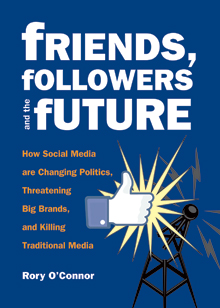Rory O'Connor has been thinking about trust and the media for a long time. As the editorial director of NewsTrust from 2005 to 2008, he helped create an online community to assess news coverage — only to conclude that members were more interested in advancing their political views. Now, in his new book, Friends, Followers, and the Future: How Social Media are Changing Politics, Threatening Big Brands, and Killing Traditional Media (City Lights), O'Connor examines the intersection of social networks, journalism, and activism. "As we no longer trust brands, we will instead discover more and more content through people and networks we trust," writes O'Connor, the winner of two Emmy awards and a George Orwell award. We talked by email.WHAT WOULD A HEALTHIER MEDIA ECOSYSTEM LOOK LIKE? The key to any healthy ecosystem is balance. So I recommend that anyone seeking trustworthy and credible news and information balance their news sources to ensure a diverse stream of information, and then use an equally balanced set of "shortcuts" or filters to assist them in helping to separate signal from noise. The filters I suggest include curators and aggregators, algorithms and recommender systems, some carefully selected legacy brands — and yes, social media. After all, the best sources of good information have always been trusted referrals via word of mouth. The modern online equivalent is trusted referrals by "word of mouse," if you will.
A LOT OF PEOPLE DON'T TRUST GOOGLE AND FACEBOOK BECAUSE OF PRIVACY CONCERNS. CAN WE EXTRICATE OURSELVES FROM THESE LARGE CORPORATIONS? Any brand, old media or new, that consistently abuses its trust relationship with its community will inevitably suffer the consequences. If someone invents a better mousetrap — or search engine or social network — I'm pretty confident masses of people will "extricate themselves" pretty rapidly from their previous tools.
FACEBOOK'S SOCIAL READER APP FOR CONSUMING NEWS IS REPORTEDLY HEMORRHAGING USERS. WHAT'S UP WITH THAT? Who would want the rest of the world to see that you've just read an article headlined "Why Women Have Sex."
I LIKE YOUR ARGUMENT THAT FACEBOOK ENCOURAGES "WEAK TIES" TO PEOPLE WITH DIFFERENT POINTS OF VIEW. Yes, one of my key points is that online social networks work quite differently from offline, "real world" ones and have unique characteristics that lend themselves to opening us up to a far more diverse stream of news and information. Offline social nets, on the other hand, encourage strong ties to far fewer people, primarily family and close friends — most of whom, not surprisingly, tend to be pretty much like us.
 |
HOW DOES THE TAO OF TWITTER DIFFER FROM THAT OF FACEBOOK? Co-founder Biz Stone told me in an interview that "Twitter is social media, but not a social network." He's right, and I think Twitter is really evolving rapidly as a social means of practicing journalism, which is a key differentiator between it and Facebook. As people like Andy "The Human Router" Carvin of NPR continue to carve out new modes of journalism-as-curation on Twitter, we will come to rely on them more and more as trusted "micro-brands" — as Carvin has done so admirably with his coverage of the Arab Spring and its aftermath.YOU INTERVIEWED ROBERT PUTNAM, THE AUTHOR OFBOWLING ALONE. CAN SOCIAL MEDIA HELP REVITALIZE CIVIC ENGAGEMENT IN THE LOCAL, PHYSICAL COMMUNITIES THAT PUTNAM HAS STUDIED? Putnam and his colleagues at Harvard agree with me that the theory of social capital and how it works both offline and on is a complex and evolving field of inquiry. Still, Putnam did allow that "the Internet might actually help revive social networks in America." And he should know, since he literally wrote the book on the subject.
 Topics
Topics:
Books
, Media, Facebook, friends, More  , Media, Facebook, friends, George Orwell, Rory O’Connor, Twitter, social media, Less
, Media, Facebook, friends, George Orwell, Rory O’Connor, Twitter, social media, Less 